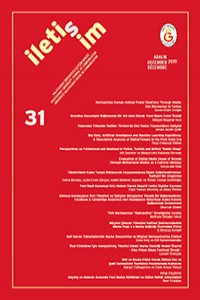Perspectives on Fatherhood and Manhood in New Media: A Narration Analysis of Polish, Turkish and British ‘Daddy Blogs’
Abstract
Blogs can be
analysed as a tool for information, identity, and building and maintaining
relationships. This study examines the phenomenon of
“daddy blogs” and aims to identify the construction of masculinity and
fatherhood in these blogs. The paper presents results of the qualitative
research on the most popular parental blogs, written by men from Poland,
United Kingdom, and Turkey (three
from each country). Study sample contains 90 blog posts, which
have been analysed qualitatively using MAXQDA Software.
As the result of
the study, three common patterns of constructing/expressing manhood and
fatherhood have been found. Firstly, manhood and fatherhood are presented
in the wider, social context. In the blog posts, the role of a father in
society, as well as gender norms are negotiated. Secondly, fatherhood is
presented in the relations to children and duties
regarding bringing them up, with visible differences in describing
father – daughter and father – son relations. The authors
often write about health, children’s development, psychology, bullying and
cyber-bullying, which can be understood as motivation to share information
rather than just express themselves. Lastly, manhood and fatherhood are
presented from the perspective of an individual, which is mostly
expressed in texts about self-development, happiness and
wellbeing. The most common motives in these
categories were: the role of a family and relationships in
life, life-work balance, time management, and spending
quality time with family. These three perspectives complement
each other, creating a complex construction of a man and a father, balancing
between traditional and modern roles.
Keywords
References
- Referans 1 Addis, M. E., & Mahalik, J. R. (2003). Men, masculinity, and the contexts of help seeking. American Psychologist, 58(1), 5-14.
- Referans 1 Albrechtslund, A. (2008). Online Social networking as participatory surveillance. First Monday, 13(3).
- Referans 3 Asenhed, L., Kilstam, J., Alehagen, S., & Baggens, C. (2014). Becoming a father is an emotional roller coaster – an analysis of first-time fathers′ blogs. Journal of Clinical Nursing, 23(9-10), 1309-1317.
- Referans 4 Ashbury, K., & Plomin, R. (2013). G is for Genes: The Impact of Genetics on Education and Achievement. New Jersey: Wiley-Blackwell.
- Referans 5 Bruns, A., & Jacobs, J. (2006). Uses of Blogs. New York: Peter Lang Publishing.
- Referans 6 Butler, J. (1990). Performative acts and gender constitution: an essay in phenomenology and feminist theory. In S.-E. Case, Performing feminisms: feminist critical theory and theatre. (pp. 270-283). Baltimore: Johns Hopkins University Press.
- Referans 7 Connell, R. (2005). Masculinities (Second Edition). Berkley and Los Angeles: University of California Press.
- Referans 8 Courtney, J. (2009). Real Men Do Housework: Ethos and Masculinity in Contemporary Domestic Advice. Rhetoric Review, 28(1), 66–81.
- Referans 9 Friedman, M. (2016). Daddyblogs Know Best: Histories of Fatherhood in the Cyber Age. In E. Podnieks, Pops in Pop Culture. Fatherhood, Masculinity and the New Man (pp. 87-120). New York: Palgrave Macmillan.
- Referans 10 Gregory, A., & Milner, S. (2005, 07 22). Fatherhood: Comparative Western Perspectives. Retrieved from Sloan Network Encyclopedia Entry: https://workfamily.sas.upenn.edu/wfrn-repo/object/zy4lk5gn3rt0su36
- Referans 11 Hookway, N. (2008). ‘Entering the blogosphere’: some strategies for using blogs in social research. Qualitative Research, 8(1), 91–113.
- Referans 12 Lammi-Taskula, J. (2008). Understanding the Gendered Use of Parental Leave in Finland. Fathering, 6(2), 133-148.
- Referans 13 Leaver, T. (2015). Born Digital? Presence, Privacy, and Intimate Surveillance. In J. &. Hartley, Re-Orientation: Translingual Transcultural Transmedia. Studies in narrative, language, identity, and knowledge (pp. 149-160). Shanghai: Fudan University Press.
- Referans 14 Lee, Y.-t. (2018). Raised Online by Daddy: Fatherhoods and Childhoods in Taiwanese Father-run Baby Blogs. Published PhD thesis, The University of Edinburgh.
- Referans 15 Livingstone, S., & Haddon, L. (2009). EU Kids Online: Final report. London: EU Kids Online.
- Referans 16 Lopez, L. K. (2009). The Radical Act of “Mommy Blogging”: Redefining Motherhood Through the Blogosphere. New Media & Society, 11(729), 729-745.
- Referans 17 Lukoff, K., Moser, C., & Schoenebeck, S. (2017). Gender Norms and Attitudes about Childcare Activities Presented on Father Blogs. Proceedings of the 2017 CHI Conference on Human Factors in Computing Systems (pp. 4966-4971). Denver: ACM Publications.
- Referans 18 McCullagh, K. (2008). Blogging: self presentation and privacy. Information & Communications Technology Law, 17(1), 3–23.
- Referans 19 Sayımer, İ., Yüksel, A., & Demir, B. (2014). Practices, New Media Based Learning; Use of Social Networks, Wikis and Blogs at University Education in Turkey. International Journal of Business and Social Science, 5(11(1)), 274-283.
- Referans 20 Scolari, C. A. (2009). Mapping conversations about new media: the theoretical field of digital communication. New media & Society, 11(6), 943–964.
- Referans 21 Silver, D. (2000). Looking Backwards, Looking Forward: Cyberculture Studies 1990-2000. In D. Gauntlett (ed.), Web.Studies: Rewiring Media Studies for the Digital (pp. 19-31). London: Oxford University Press.
- Referans 22 Smith, J. A., Braunack-Mayer, A., Wittert, G., & Warin, M. (2007). “I've been independent for so damn long!”: Independence, masculinity and aging in a help seeking context. Journal of Aging Studies, 21, 325–335.
- Referans 23 Statista.com. (2018, July 11). Number of bloggers in the United States from 2014 to 2020 (in millions). Retrived August 29, 2018, from: www.statista.com/statistics/187267/number-of-bloggers-in-usa/
- Referans 24 Webb, L., & Lee, B. S. (2011). Mommy Blogs: The Centrality of Community in the Performance of Online Maternity. In M. Moravec, In book: Motherhood online: How online communities shape modern motherhood. (pp. 244-257). Newcastle Upon Tyne: Cambridge Scholars Publishing.
- Referans 25 West, C., & Zimmerman, D. H.–1. (2009). Accounting for doing gender. Gender & Society, 23(1), 112-122.
- Referans 26 Yelsalı Parmaksız, P. M. (2012). Digital Opportunities for Social Transition: Blogosphere and Motherhood in Turkey. Feminist Eleştiri, 4(1), 123-134.
Details
| Primary Language | English |
|---|---|
| Journal Section | Articles |
| Authors | |
| Publication Date | December 28, 2019 |
| Acceptance Date | September 24, 2019 |
| Published in Issue | Year 2019 Issue: 31 |



